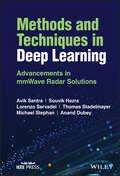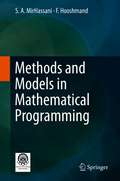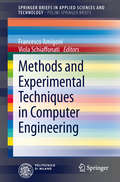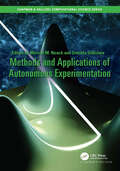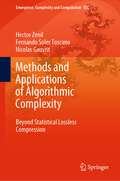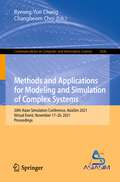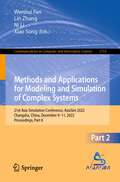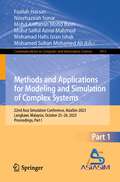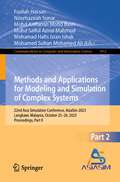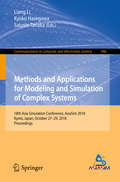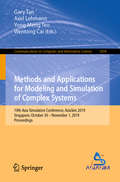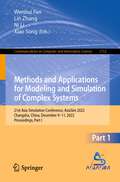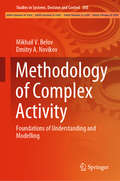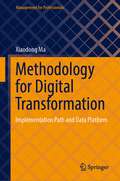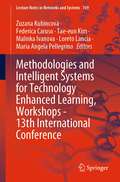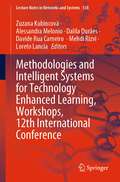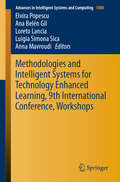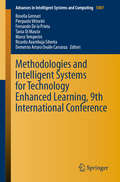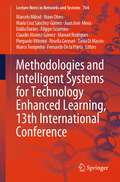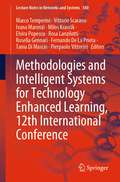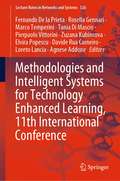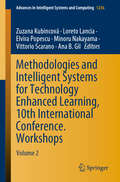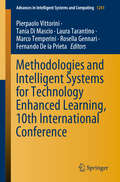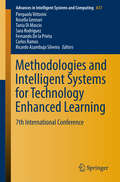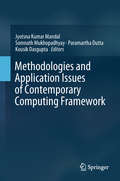- Table View
- List View
Methods and Techniques in Deep Learning: Advancements in mmWave Radar Solutions
by Avik Santra Souvik Hazra Lorenzo Servadei Thomas Stadelmayer Michael Stephan Anand DubeyMethods and Techniques in Deep Learning Introduces multiple state-of-the-art deep learning architectures for mmWave radar in a variety of advanced applications Methods and Techniques in Deep Learning: Advancements in mmWave Radar Solutions provides a timely and authoritative overview of the use of artificial intelligence (AI)-based processing for various mmWave radar applications. Focusing on practical deep learning techniques, this comprehensive volume explains the fundamentals of deep learning, reviews cutting-edge deep metric learning techniques, describes different typologies of reinforcement learning (RL) algorithms, highlights how domain adaptation (DA) can be used for improving the performance of machine learning (ML) algorithms, and more. Throughout the book, readers are exposed to product-ready deep learning solutions while learning skills that are relevant for building any industrial-grade, sensor-based deep learning solution. A team of authors with more than 70 filed patents and 100 published papers on AI and sensor processing illustrates how deep learning is enabling a range of advanced industrial, consumer, and automotive applications of mmWave radars. In-depth chapters cover topics including multi-modal deep learning approaches, the elemental blocks required to formulate Bayesian deep learning, how domain adaptation (DA) can be used for improving the performance of machine learning algorithms, and geometric deep learning are used for processing point clouds. In addition, the book: Discusses various advanced applications and how their respective challenges have been addressed using different deep learning architectures and algorithms Describes deep learning in the context of computer vision, natural language processing, sensor processing, and mmWave radar sensors Demonstrates how deep parametric learning reduces the number of trainable parameters and improves the data flow Presents several human-machine interface (HMI) applications such as gesture recognition, human activity classification, human localization and tracking, in-cabin automotive occupancy sensing Methods and Techniques in Deep Learning: Advancements in mmWave Radar Solutions is an invaluable resource for industry professionals, researchers, and graduate students working in systems engineering, signal processing, sensors, data science, and AI.
Methods and Models in Mathematical Programming
by F. Hooshmand S. A. MirHassaniThis book focuses on mathematical modeling, describes the process of constructing and evaluating models, discusses the challenges and delicacies of the modeling process, and explicitly outlines the required rules and regulations so that the reader will be able to generalize and reuse concepts in other problems by relying on mathematical logic.Undergraduate and postgraduate students of different academic disciplines would find this book a suitable option preparing them for jobs and research fields requiring modeling techniques. Furthermore, this book can be used as a reference book for experts and practitioners requiring advanced skills of model building in their jobs.
Methods and Experimental Techniques in Computer Engineering
by Francesco Amigoni Viola SchiaffonatiComputing and science reveal a synergic relationship. On the one hand, it is widely evident that computing plays an important role in the scientific endeavor. On the other hand, the role of scientific method in computing is getting increasingly important, especially in providing ways to experimentally evaluate the properties of complex computing systems. This book critically presents these issues from a unitary conceptual and methodological perspective by addressing specific case studies at the intersection between computing and science. The book originates from, and collects the experience of, a course for PhD students in Information Engineering held at the Politecnico di Milano. Following the structure of the course, the book features contributions from some researchers who are working at the intersection between computing and science.
Methods and Applications of Autonomous Experimentation (Chapman & Hall/CRC Computational Science)
by Marcus M. Noack Daniela UshizimaAutonomous Experimentation is poised to revolutionize scientific experiments at advanced experimental facilities. Whereas previously, human experimenters were burdened with the laborious task of overseeing each measurement, recent advances in mathematics, machine learning and algorithms have alleviated this burden by enabling automated and intelligent decision-making, minimizing the need for human interference. Illustrating theoretical foundations and incorporating practitioners’ first-hand experiences, this book is a practical guide to successful Autonomous Experimentation. Despite the field’s growing potential, there exists numerous myths and misconceptions surrounding Autonomous Experimentation. Combining insights from theorists, machine-learning engineers and applied scientists, this book aims to lay the foundation for future research and widespread adoption within the scientific community. This book is particularly useful for members of the scientific community looking to improve their research methods but also contains additional insights for students and industry professionals interested in the future of the field.
Methods and Applications of Algorithmic Complexity: Beyond Statistical Lossless Compression (Emergence, Complexity and Computation #44)
by Hector Zenil Fernando Soler Toscano Nicolas GauvritThis book explores a different pragmatic approach to algorithmic complexity rooted or motivated by the theoretical foundations of algorithmic probability and explores the relaxation of necessary and sufficient conditions in the pursuit of numerical applicability, with some of these approaches entailing greater risks than others in exchange for greater relevance and applicability. Some established and also novel techniques in the field of applications of algorithmic (Kolmogorov) complexity currently coexist for the first time, ranging from the dominant ones based upon popular statistical lossless compression algorithms (such as LZW) to newer approaches that advance, complement, and also pose their own limitations. Evidence suggesting that these different methods complement each other for different regimes is presented, and despite their many challenges, some of these methods are better grounded in or motivated by the principles of algorithmic information. The authors propose that the field can make greater contributions to science, causation, scientific discovery, networks, and cognition, to mention a few among many fields, instead of remaining either as a technical curiosity of mathematical interest only or as a statistical tool when collapsed into an application of popular lossless compression algorithms. This book goes, thus, beyond popular statistical lossless compression and introduces a different methodological approach to dealing with algorithmic complexity. For example, graph theory and network science are classic subjects in mathematics widely investigated in the twentieth century, transforming research in many fields of science from economy to medicine. However, it has become increasingly clear that the challenge of analyzing these networks cannot be addressed by tools relying solely on statistical methods. Therefore, model-driven approaches are needed. Recent advances in network science suggest that algorithmic information theory could play an increasingly important role in breaking those limits imposed by traditional statistical analysis (entropy or statistical compression) in modeling evolving complex networks or interacting networks. Further progress on this front calls for new techniques for an improved mechanistic understanding of complex systems, thereby calling out for increased interaction between systems science, network theory, and algorithmic information theory, to which this book contributes.
Methods and Applications for Modeling and Simulation of Complex Systems: 20th Asian Simulation Conference, AsiaSim 2021, Virtual Event, November 17–20, 2021, Proceedings (Communications in Computer and Information Science #1636)
by Byeong-Yun Chang Changbeom ChoiThis volume constitutes the proceedings of the 20th Asian Simulation Conference, AsiaSim 2021, held as a virtual event in November 2021.The 9 full papers presented in this volume were carefully reviewed and selected from 23 submissions. The papers are organized in topical sections on simulation and visualization; modeling and simulation of systems.
Methods and Applications for Modeling and Simulation of Complex Systems: 21st Asia Simulation Conference, AsiaSim 2022, Changsha, China, December 9-11, 2022, Proceedings, Part II (Communications in Computer and Information Science #1713)
by Wenhui Fan Lin Zhang Ni Li Xiao SongThe two-volume set CCIS 1712 and 1713 constitutes the proceedings of the 21st Asian Simulation Conference, AsiaSim 2022, which took place in Changsha, China, in January 2023. Due to the Covid pandemic AsiaSim 2022 has been postponed to January 2023. The 97 papers presented in the proceedings were carefully reviewed and selected from 218 submissions. The contributions were organized in topical sections as follows: Modeling theory and methodology; Continuous system/discrete event system/hybrid system/intelligent system modeling and simulation; Complex systems and open, complex and giant systems modeling and simulation; Integrated natural environment and virtual reality environment modeling and simulation; Networked Modeling and Simulation; Flight simulation, simulator, simulation support environment, simulation standard and simulation system construction; High performance computing, parallel computing, pervasive computing, embedded computing and simulation; CAD/CAE/CAM/CIMS/VP/VM/VR/SBA; Big data challenges and requirements for simulation and knowledge services of big data ecosystem; Artificial intelligence for simulation; Application of modeling/simulation in science/engineering/society/economy /management/energy/transportation/life/biology/medicine etc; Application of modeling/simulation in energy saving/emission reduction, public safety, disaster prevention/mitigation; Modeling/simulation applications in the military field; Modeling/simulation applications in education and training; Modeling/simulation applications in entertainment and sports.
Methods and Applications for Modeling and Simulation of Complex Systems: 22nd Asia Simulation Conference, AsiaSim 2023, Langkawi, Malaysia, October 25–26, 2023, Proceedings, Part I (Communications in Computer and Information Science #1911)
by Fazilah Hassan Noorhazirah Sunar Mohd Ariffanan Mohd Basri Mohd Saiful Azimi Mahmud Mohamad Hafis Izran Ishak Mohamed Sultan Mohamed AliThis book constitutes the refereed proceedings of the 22nd Asia Simulation Conference on Methods and Applications for Modeling and Simulation of Complex Systems, AsiaSim 2023, held in Langkawi, Malaysia, during October 25–26, 2023.The 77 full papers included in this book were carefully reviewed and selected from 164 submissions. They were organized in topical sections as follows: Modelling and Simulation, Artificial intelligence, Industry 4.0, Digital Twins Modelling, Simulation and Gaming, Simulation for Engineering, Simulation for Sustainable Development, Simulation in Social Sciences.
Methods and Applications for Modeling and Simulation of Complex Systems: 22nd Asia Simulation Conference, AsiaSim 2023, Langkawi, Malaysia, October 25–26, 2023, Proceedings, Part II (Communications in Computer and Information Science #1912)
by Fazilah Hassan Noorhazirah Sunar Mohd Ariffanan Mohd Basri Mohd Saiful Azimi Mahmud Mohamad Hafis Izran Ishak Mohamed Sultan Mohamed AliThis book constitutes the refereed proceedings of the 22nd Asia Simulation Conference on Methods and Applications for Modeling and Simulation of Complex Systems, AsiaSim 2023, held in Langkawi, Malaysia, during October 25–26, 2023.The 77 full papers included in this book were carefully reviewed and selected from 164 submissions. They were organized in topical sections as follows: Modelling and Simulation, Artificial intelligence, Industry 4.0, Digital Twins Modelling, Simulation and Gaming, Simulation for Engineering, Simulation for Sustainable Development, Simulation in Social Sciences.
Methods and Applications for Modeling and Simulation of Complex Systems: 18th Asia Simulation Conference, AsiaSim 2018, Kyoto, Japan, October 27–29, 2018, Proceedings (Communications in Computer and Information Science #946)
by Liang Li Kyoko Hasegawa Satoshi TanakaThis volume constitutes the proceedings of the 18th Asia Simulation Conference, AsiaSim 2018, held in Kyoto, Japan, in August 2018.The 45 revised full papers presented in this volume were carefully reviewed and selected from 90 submissions. The papers are organized in topical sections on modeling and simulation technology; soft computing and machine learning; high performance computing and cloud computing; simulation technology for industry; simulation technology for intelligent society; simulation of instrumentation and control application; computational mathematics and computational science; flow simulation; visualization and computer vision to support simulation.
Methods and Applications for Modeling and Simulation of Complex Systems: 19th Asia Simulation Conference, AsiaSim 2019, Singapore, October 30 – November 1, 2019, Proceedings (Communications in Computer and Information Science #1094)
by Gary Tan Axel Lehmann Yong Meng Teo Wentong CaiThis volume constitutes the proceedings of the 19th Asia Simulation Conference, AsiaSim 2019, held in Singapore, Singapore, in October 2019.The 19 revised full papers and 5 short papers presented in this volume were carefully reviewed and selected from 36 submissions. The papers are organized in topical sections on simulation and modeling methodology; numerical and Monte Carlo simulation; simulation applications: blockchain, deep learning and cloud; simulation and visualization; simulation applications; short papers.
Methods and Applications for Modeling and Simulation of Complex Systems: 21st Asia Simulation Conference, AsiaSim 2022, Changsha, China, December 9-11, 2022, Proceedings, Part I (Communications in Computer and Information Science #1712)
by Lin Zhang Xiao Song Wenhui Fan Ni LiThe two-volume set CCIS 1712 and 1713 constitutes the proceedings of the 21st Asian Simulation Conference, AsiaSim 2022, which took place in Changsha, China, in January 2023. Due to the Covid pandemic AsiaSim 2022 has been postponed to January 2023. The 97 papers presented in the proceedings were carefully reviewed and selected from 218 submissions. The contributions were organized in topical sections as follows: Modeling theory and methodology; Continuous system/discrete event system/hybrid system/intelligent system modeling and simulation; Complex systems and open, complex and giant systems modeling and simulation; Integrated natural environment and virtual reality environment modeling and simulation; Networked Modeling and Simulation; Flight simulation, simulator, simulation support environment, simulation standard and simulation system construction; High performance computing, parallel computing, pervasive computing, embedded computing and simulation; CAD/CAE/CAM/CIMS/VP/VM/VR/SBA; Big data challenges and requirements for simulation and knowledge services of big data ecosystem; Artificial intelligence for simulation; Application of modeling/simulation in science/engineering/society/economy /management/energy/transportation/life/biology/medicine etc; Application of modeling/simulation in energy saving/emission reduction, public safety, disaster prevention/mitigation; Modeling/simulation applications in the military field; Modeling/simulation applications in education and training; Modeling/simulation applications in entertainment and sports.
Methodology of Complex Activity: Foundations of Understanding and Modelling (Studies in Systems, Decision and Control #300)
by Mikhail V. Belov Dmitry A. NovikovThis book develops and describes a general methodology that can be applied to any complex human activity (activity with a non-trivial, multi-level internal structure).The structural components of complex activities are considered, and their logical, cause-and-effect, and process structures are functionally described. Considerable attention is paid to organization and management, uncertainties, and the lifecycles of activities, as well as the actors, subject matter, resources, knowledge, and methods involved. Several typical examples are used throughout the text to illustrate the implementation of common approaches involving the functioning of work groups, organizational units, projects, and organizations in general: a retail bank, an aircraft manufacturer, a fire department, and a nuclear power plant. In addition, the book employs a system of connected technical models, in order to ensure that the results are of practical applicability for both experts on the ground and scholars engaged in research on the general principles of how activities (practical, scientific, etc.) are organized or on the management of socio-technical systems.
Methodology for Digital Transformation: Implementation Path and Data Platform (Management for Professionals)
by Xiaodong MaThis book focuses on why and how to achieve digital transformation for enterprises and organizations by introducing cases in China. Its purpose is to highlight the importance and improve the understanding for digital transformation and related issues, like human resource allocation, and how to improve the efficiency and success rate in a low-cost and low-risk way. In this way, the cases in the book avoid the most common traps during the digital transformation process, enabling R&D and business personnel, and data practitioners in the organization to figure out the implementation and processes involved, and hence better understand how to work with senior management team when implementing the transition plan. The middle and senior level managers such as company executives, presidents in banks and universities, and officials in government, are also the target audience.
Methodologies and Intelligent Systems for Technology Enhanced Learning, Workshops - 13th International Conference (Lecture Notes in Networks and Systems #769)
by Zuzana Kubincová Federica Caruso Tae-Eun Kim Malinka Ivanova Loreto Lancia Maria Angela PellegrinoThis book includes the accepted papers of the four selected workshops which focus on integration of emerging technologies into education and training (ETELT), Interactive Environments and Emerging Technologies for eLearning (IEETeL), Technology Enhanced Learning in Nursing Education (Nursing), and Technology Enhanced Learning for Future Citizens (TEL4FC). Education is the cornerstone of any society; it serves as one of the foundations for many of its social values and characteristics. mis4TEL’23 promotes the interaction among the scientific community to discuss applications of Technology Enhanced Learning solutions targeting not only cognitive and social processes but also motivational, personality, or emotional factors. In addition, current trends concerning the use of artificial intelligence can help and augment learning opportunities for learners and educators. We would like to thank all the contributing authors, the members of the program committee, national associations (AEPIA, and APPIA), and the sponsors (AIR Institute, and Camara Municipal de Guimarães).
Methodologies and Intelligent Systems for Technology Enhanced Learning, Workshops, 12th International Conference (Lecture Notes in Networks and Systems #538)
by Zuzana Kubincová Alessandra Melonio Dalila Durães Davide Rua Carneiro Mehdi Rizvi Loreto LanciaThis book covers the 12th International Conference in Methodologies and Intelligent Systems for Technology Enhanced Learning which was hosted by the University of L'Aquila and was held in L'Aquila (Italy) from July 13 to 15, 2022. The conference has established itself as a consolidated fertile forum where scholars and professionals from the international community, with a broad range of expertise in the TEL field, share results and compare experiences. Technologies in TEL are capable of delivering smart, personalized, tailored, and motivating learning solutions. Methods are coming from different fields, such as education, psychology, medicine, computer science, and from diverse communities, where collaboration and co-working are used.
Methodologies and Intelligent Systems for Technology Enhanced Learning, 9th International Conference, Workshops (Advances in Intelligent Systems and Computing #1008)
by Elvira Popescu Loreto Lancia Ana Belén Gil Luigia Simona Sica Anna MavroudiThis book is based on the 9th International Conference in Methodologies and Intelligent Systems for Technology Enhanced Learning, which was hosted by the University of Salamanca and held in Ávila (Spain) from 26th to 28th June 2019. Expanding on the topics of the evidence-based TEL workshops series, it provides an open forum for discussing intelligent technologies for learning. In particular, it discusses recommendation mechanisms that enable us to tailor learning to different contexts and people, e.g., by considering their personality; and learning analytics that help augment learning opportunities, e.g., by supporting the adaptation of the learning material. In addition to technologies, it covers methods from different fields, such as educational psychology or medicine, and from diverse communities co-working with people, such as making communities and participatory design communities to help create novel TEL opportunities. Further it describes the use of methods and technologies to investigate and enhance learning for “fragile users”, like children, the elderly and those with special needs. We thank the sponsors: IEEE Systems Man and Cybernetics Society Spain Section Chapter and the IEEE Spain Section (Technical Co-Sponsor), IBM, Indra, Viewnext, Global exchange, AEPIA, APPIA and AIR institute.
Methodologies and Intelligent Systems for Technology Enhanced Learning, 9th International Conference (Advances in Intelligent Systems and Computing #1007)
by Rosella Gennari Pierpaolo Vittorini Fernando De la Prieta Tania Di Mascio Marco Temperini Ricardo Azambuja Silveira Demetrio Arturo Ovalle CarranzaThis book, which gathers the outcomes of the 9th International Conference on Methodologies and Intelligent Systems for Technology Enhanced Learning and its related workshops, expands on the topics of the evidence-based TEL workshop series in order to provide an open forum for discussing intelligent systems for TEL, their roots in novel learning theories, empirical methodologies for their design and evaluation, stand-alone solutions, and web-based ones. The Conference was hosted by the University of Salamanca and was held in Ávila (Spain) from the 26th to the 28th of June 2019. Its goal was to bring together researchers and developers from industry, education, and the academic world to report on the latest scientific research, technical advances, and methodologies. We wish to thank the sponsors: IEEE Systems Man and Cybernetics Society, Spain Section Chapter and the IEEE Spain Section (Technical Co-Sponsor), IBM, Indra, Viewnext, Global Exchange, AEPIA, APPIA and AIR institute.
Methodologies and Intelligent Systems for Technology Enhanced Learning, 13th International Conference (Lecture Notes in Networks and Systems #764)
by Marcelo Milrad Nuno Otero María Cruz Sánchez-Gómez Juan José Mena Dalila Durães Filippo Sciarrone Claudio Alvarez-Gómez Manuel Rodrigues Pierpaolo Vittorini Rosella Gennari Tania Di Mascio Marco Temperini Fernando De la PrietaEducation is the cornerstone of any society; it serves as one of the foundations for many of its social values and characteristics. mis4TEL’23 promotes the interaction among the scientific community to discuss applications of Technology Enhanced Learning solutions targeting not only cognitive and social processes but also motivational, personality, or emotional factors. In addition, current trends concerning the use of artificial intelligence can help and augment learning opportunities for learners and educators. The 13th International Conference on Methodologies and Intelligent Systems for Technology Enhanced Learning (mis4TEL’23) technical program includes 26 contributions (13 full papers and 13 short papers). mis4TEL’23 is hosted by the LASI and Centro Algoritmi of the University of Minho (Portugal). The authors would like to thank all the contributing authors, the members of the Program Committee, National Associations (AEPIA and APPIA), and the sponsors (AIR Institute and Camara Municipal de Guimarães).
Methodologies and Intelligent Systems for Technology Enhanced Learning, 12th International Conference (Lecture Notes in Networks and Systems #580)
by Marco Temperini Vittorio Scarano Ivana Marenzi Milos Kravcik Elvira Popescu Rosa Lanzilotti Rosella Gennari Fernando De La Prieta Tania Di Mascio Pierpaolo VittoriniThe 12th International Conference in Methodologies and Intelligent Systems for Technology Enhanced Learning was hosted by the University of L'Aquila and was held in L'Aquila (Italy) from July 13 to 15, 2022. The conference has established itself as a consolidated fertile forum where scholars and professionals from the international community, with a broad range of expertise in the TEL field, share results and compare experiences Technologies in TEL are capable of delivering smart, personalized, tailored, and motivating learning solutions. Methods are coming from different fields, such as education, psychology, medicine, computer science, and from diverse communities, where collaboration and co-working are used.
Methodologies and Intelligent Systems for Technology Enhanced Learning, 11th International Conference (Lecture Notes in Networks and Systems #326)
by Fernando De la Prieta Rosella Gennari Marco Temperini Tania Di Mascio Pierpaolo Vittorini Zuzana Kubincova Elvira Popescu Davide Rua Carneiro Loreto Lancia Agnese AddoneState-of-the-art and novel methodologies and technologies allow researchers, designers, and domain experts to pursue technology-enhanced learning (TEL) solutions targeting not only cognitive processes but also motivational, personality, or emotional factors. The International Conference in Methodologies and Intelligent Systems for Technology-Enhanced Learning (MIS4TEL'21) is hosted by the University of Salamanca and was held in Salamanca (Spain) from October 6–8, 2021. The annual appointment of MIS4TEL established itself as a consolidated fertile forum where scholars and professionals from the international community, with a broad range of expertise in the TEL field, share results and compare experiences. The calls for papers of the 11th edition of the conference welcomed novel research in TEL and expands on the topics of the previous editions: It solicited work from new research fields (ranging from artificial intelligence and agent-based systems to robotics, virtual reality, Internet of things and wearable solutions, among others) concerning methods and technological opportunities, and how they serve to create novel approaches to TEL, innovative TEL solutions, and valuable TEL experiences.
Methodologies and Intelligent Systems for Technology Enhanced Learning, 10th International Conference. Workshops: Volume 2 (Advances in Intelligent Systems and Computing #1236)
by Zuzana Kubincová Loreto Lancia Elvira Popescu Minoru Nakayama Vittorio Scarano Ana B. GilThis book features papers from workshops at the 10th International Conference on Methodologies and Intelligent Systems for Technology Enhanced Learning, which was hosted by the University of L'Aquila (Italy) from 17th to 19th June 2020. The workshops provided participants with the opportunity to present and discuss novel research ideas on emerging topics complementing the main conference. They particularly focused on multi-disciplinary and transversal aspects such as TEL in nursing education programs, social and personal computing for web-supported learning communities, interactive environments and emerging technologies for eLearning, and TEL for future citizens.
Methodologies and Intelligent Systems for Technology Enhanced Learning, 10th International Conference (Advances in Intelligent Systems and Computing #1241)
by Pierpaolo Vittorini Tania Di Mascio Laura Tarantino Marco Temperini Rosella Gennari Fernando De la PrietaThis book intends to bring together researchers and developers from industry, the education field, and the academic world to report on the latest scientific research, technical advances, and methodologies. The 10th International Conference in Methodologies and Intelligent Systems for Technology Enhanced Learning is hosted by the University of L’Aquila and is going to be held in L’Aquila (Italy). Initially planned on the 17th to the 19th of June 2020, it was postponed to the 7th to the 9th of October 2020, due to the COVID-19 outbreak. The 10th edition of this conference and its related workshops expand the topics of the evidence-based TEL workshops series in order to provide an open forum for discussing intelligent systems for TEL, their roots in novel learning theories, empirical methodologies for their design or evaluation, stand-alone solutions, or web-based ones. This bridge has been realized also thanks to the sponsor of this edition of MIS4TEL: the Armundia Group https://www.armundia.com, the support from national associations (AEPIA, APPIA, CINI, and EurAI), and organizers (UNIVAQ, UNIROMA1, UNIBZ, UCV, UFSC, USAL, AIR institute, UNC, and UNIBA)
Methodologies and Intelligent Systems for Technology Enhanced Learning
by Pierpaolo Vittorini Rosella Gennari Tania Di Mascio Sara Rodríguez Fernando De la Prieta Carlos Ramos Ricardo Azambuja SilveiraThis book presents the outcomes of the 7th International Conference in Methodologies and Intelligent Systems for Technology Enhanced Learning (MIS4TEL'17), hosted by the Polytechnic of Porto, Portugal from 21 to 23 June 2017. Expanding on the topics of the previous conferences, it provided an open forum for discussing intelligent systems for technology enhanced learning (TEL) and their roots in novel learning theories, empirical methodologies for their design or evaluation, stand-alone and web-based solutions, and makerspaces. It also fostered entrepreneurship and business startup ideas, bringing together researchers and developers from industry, education and the academic world to report on the latest scientific research, technical advances and methodologies.
Methodologies and Application Issues of Contemporary Computing Framework
by Jyotsna Kumar Mandal Somnath Mukhopadhyay Paramartha Dutta Kousik DasguptaThis book brings together the diversified areas of contemporary computing frameworks in the field of Computer Science, Engineering and Electronic Science. It focuses on various techniques and applications pertaining to cloud overhead, cloud infrastructure, high speed VLSI circuits, virtual machines, wireless and sensor networks, clustering and extraction of information from images and analysis of e-mail texts. The state-of-the-art methodologies and techniques are addressed in chapters presenting various proposals for enhanced outcomes and performances. The techniques discussed are useful for young researchers, budding engineers and industry professionals for applications in their respective fields.
